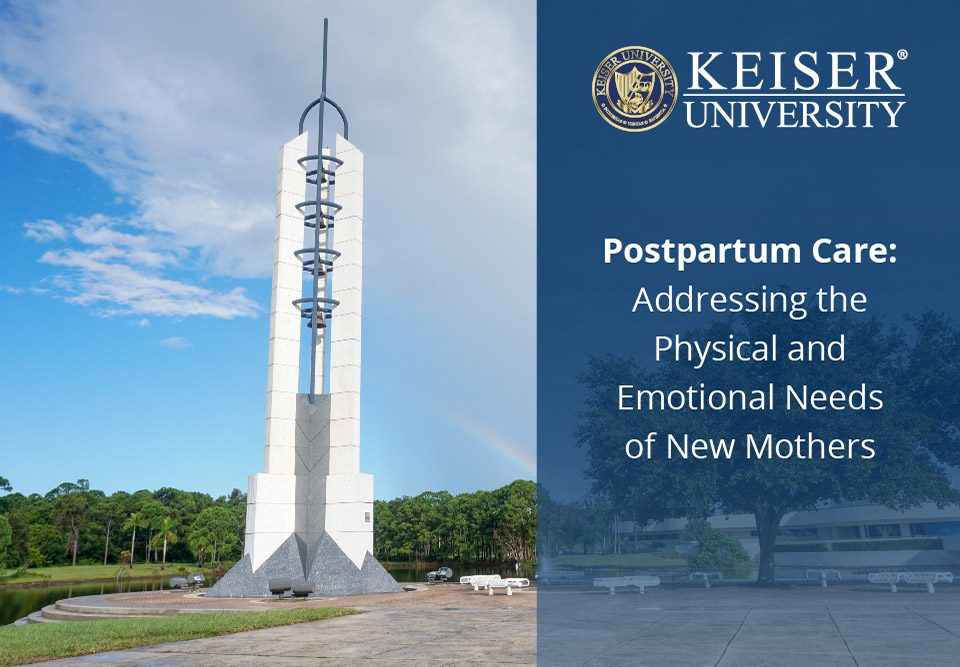Postpartum Care: Addressing the Physical and Emotional Needs of New Mothers

The moments immediately following the birth of a child are exhilarating, not only for the new parents but also for the nurses and doctors who helped...
The moments immediately following the birth of a child are exhilarating, not only for the new parents but also for the nurses and doctors who helped to bring that new life into the world. While the focus and attention tends to immediately turn to the newborn child, however, it is essential for healthcare providers to offer the new mother personalized and compassionate postpartum care as well.
Nurses who are pursuing a master’s degree in order to practice in a specialized area of nursing (such as women’s health, nurse-midwifery, or family nursing) will want to develop an understanding of the postpartum care strategies that prioritize the emotional and physical needs of the patient.
According to the Cleveland Clinic, the postpartum period begins immediately following the delivery of a child and lasts for about eight weeks following the birth. Postpartum care is considered to be the physical care and emotional support that a woman receives from her healthcare providers during this timeframe. Although most women will only spend a few days in the hospital following the birth of their child, it is critical for healthcare providers to offer support throughout the entire postpartum period.
Providing new mothers with physical and emotional support during the postpartum period is crucial. According to the World Health Organization, personalized and proactive care during the postpartum period can help to:
Movies and television shows often depict childbirth and the postpartum period as a blissful experience in which a mother cradles her newborn baby in the soft glow of the afternoon light. Yet, the reality of the matter is that this can be a particularly challenging time for new mothers. According to the Mayo Clinic, common challenges that women face during the postpartum period include:
The postpartum period is a critical time in a woman’s emotional and physical recovery, and healthcare providers can play a pivotal part in ensuring that women feel as comfortable and confident as possible during this time. Emphasizing the importance of attentive and personalized care, nurses and other healthcare providers can monitor the patient for warning signs of severe complications while simultaneously providing them with the emotional and physical support required during their recovery.
The physical needs of a new mother often take high priority during the immediate hours following the delivery of her child. Nurses will need to consider the type of delivery when addressing the physical needs of the patient — but according to the Cleveland Clinic, the primary physical concerns during the postpartum period include pain and discomfort, the shrinking size of the uterus, vaginal discharge and breast engorgement.
During this time of physical change and ongoing healing, nurses and other healthcare providers should ensure that the patient is receiving well-balanced meals and plenty of water. By providing their patients with nourishing and healthy meals, nurses can help them feel revived and refreshed. Proper nutrition and hydration are also essential for milk production.
Simply put, labor and birth is exhausting, and then the mother must tend to the needs of her newborn baby while she is recovering physically, which requires rest. Postpartum sleep deprivation is one of the most difficult physical challenges that women may face after having a baby. Nurses can work to ensure that the new mother is able to rest and sleep as much as possible by keeping visitors to a minimum and protecting the new mother’s space following the birth.
In addition to providing women with the physical care and support they need in the days and weeks following childbirth, they also may need additional emotional support. In fact, in many ways, the emotional needs of new mothers should take priority, as hormonal changes during this time leave them vulnerable to feelings of anxiety and depression.
Hormonal fluctuations and emotional adjustments will continue to occur throughout the postpartum period. According to Parents magazine, this is what new mothers can expect during the postpartum period in regard to hormonal changes:
Sometimes, the signs of postpartum depression and anxiety are not that obvious — especially to a new mother or her partner. Providing postpartum patients with ongoing care and support allows nurses and healthcare providers to observe and monitor for signs of postpartum depression and anxiety. According to the Mayo Clinic, the most common signs of postpartum depression and anxiety include:
Important Note
If you are someone you know is feeling suicidal or mentions harm to oneself/themselves or the baby, contact your healthcare provider immediately. There are options to consider.
Healthcare providers need to closely monitor postpartum patients and connect them with professional resources for mental health if they notice the signs or symptoms of postpartum depression. Through prioritizing maternal mental health, nurses can ensure that more mothers are able to transition smoothly through this period.
The American Academy of Pediatrics recommends that new mothers breastfeed their infants exclusively for at least six months, noting that breastfeeding is one of the best ways to achieve the most positive health outcomes for newborns and their mothers. Nurses should work to create a nursing care plan for postpartum women that allows them to develop a positive breastfeeding relationship with their newborn babies.
According to the Centers for Disease Control, breastfeeding is beneficial for both the mother and the child. It is the best source of nutrition for developing infants, providing them with the antibodies needed to develop a strong immune system. Additionally, it can help lower the risk of high blood pressure, type 2 diabetes and some types of cancer in women.
While breastfeeding is a natural way to feed a newborn, it is not always easy. Some of the common challenges with breastfeeding include difficulty latching, inability to produce enough milk and sleep deprivation associated with feeding.
Breastfeeding can play a powerful role in developing a strong bond between mother and infant. Nurses and healthcare providers can encourage and strengthen that bond by teaching the new mom to make eye contact with her baby, enjoy as much skin-to-skin contact as possible and talk to and sing to the baby.
Nurses can also work closely with postpartum women in those pivotal first weeks of motherhood in order to establish a feeding schedule that works for both mother and baby, reducing some of the stress associated with breastfeeding. Most stress comes from initial difficulty with getting the infant to latch-on. Nurses can suggest techniques to new mothers that can assist with latching on.
The postpartum support system for any patient should begin with the healthcare team but extend out to include the patient’s partner, family members and trusted friends.
According to the American College of Obstetricians and Gynecologists, family plays an integral role in the physical and emotional recovery of a new mother. Family members, like the patient’s partner or other relatives, can ensure that the mother is able to rest, recover and bond with her new baby.
In many cases, women benefit from professional postpartum services, such as the assistance of a lactation consultant or visitations from home health nurses who will continue to monitor their progress. A woman who is experiencing the signs and symptoms of postpartum depression or anxiety should work closely with maternal mental health professionals to get the care she needs.
The postpartum period defines the first few weeks of motherhood — but the routines established during this time can actually protect the long-term health and well-being of the patient.
New mothers often selflessly want to devote all their time and energy to caring for their new baby, but nurses can play a central role in encouraging them to establish their own self-care routines. By reminding postpartum women that they can (and should) make time for themselves, nurses can help new mothers understand that self-care will make them better parents throughout their entire journey.
Nurses and healthcare providers can work closely with their patients to provide them with accurate information about what to expect during their recovery. It is important for nurses to gently remind postpartum women that it took their bodies nearly nine months to change, and it will therefore take time for them to return to their former physical shape and abilities.
Childbirth is an overwhelming experience with its inherent ups and downs, not only physically but also emotionally. At Keiser University Graduate School, we are proud to offer graduate degree programs in nursing that allow students to develop the advanced clinical skills required to provide patients with empathetic and personalized postpartum care.
Whether you pursue a general Master of Science in Nursing (MSN) degree or opt for a more specialized Master of Science in Nursing, Women’s Health Nurse Practitioner or Master of Science in Nursing, Family Nurse Practitioner degree program, you have the opportunity to learn more about the importance of postnatal care. Request more information about our graduate degree programs today.









